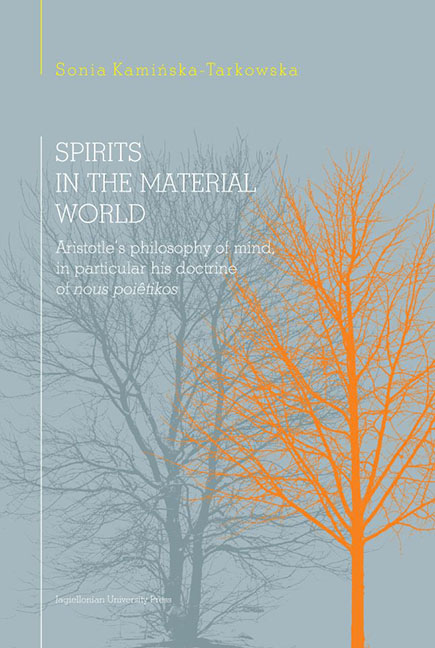 Spirits in the Material World
Spirits in the Material World Introduction
Published online by Cambridge University Press: 14 October 2023
Summary
Rational vs. Mystical Readings of Aristotle’s Nous Poiêtikos. Introduction to the Subject and Overview of Central Positions
One of the authors who inspired me to start the journey in search of nous poiêtikos’s proper function, besides Aristotle and Franz Brentano (to whom I have devoted a decade of research and whose Aristotelianism has shaped my thinking profoundly, although I often disagree with him), is Victor Caston. Caston – in his brilliant and provocative paper ‘Aristotle’s Two Intellects. A Modest Proposal’ – claims that nous poiêtikos has no proper function and thus does nothing. He calls the attempts to find this function ‘a wild goose chase’. Well … he may be right. However, it is not easy to come to terms with this (dis)solution. It is both bold and disturbing. Although it is designed to bring peace, it does not put my worries to sleep. And it makes me want to dig deeper. Thus, I am embarking on this project full of hope and with a strong conviction that it is all about the journey and not (just) the destination. To avoid getting lost in Aristotle and Aristotelian interpretations, I have divided the readings of nous poiêtikos into mystical and rational ones. What inspired me here is Rolf George’s opinion, expressed in the introduction to his translation of Franz Brentano’s Habilitationsschrift: Die Psychologie des Aristoteles, insbesondere seine Lehre vom nous poietikos (1867). George claimed there that Brentano was against all the mystical elements and traces in the interpretation of Corpus Aristotelicum. Interestingly, Brentano does not explicitly declare war against mysticism and does not use this label in his Aristotelian writings (he does criticise mysticism as the phase of philosophy’s decay some time later, but it is a different mysticism though). George’s remark was pointed at Brentano’s lifelong discussion with Eduard Zeller (see, for instance, Aristoteles Lehre vom Ursprung des menschlichen Geistes). Interestingly, if one scrutinises all the philosophical theories denounced by Brentano in his Habilitationsschrift, one will clearly see that they have a lot in common. I borrow the name from George, and I call these views (and the contemporary, post-Brentanian ones that are somehow similar to them) ‘mystical’. Along these lines, I call the adherents of the opposite ones – ‘rationalists’.
- Type
- Chapter
- Information
- Spirits in the Material WorldAristotle's Philosophy of Mind in Particular His Doctrine of Nous Poiêtikos, pp. 11 - 26Publisher: Jagiellonian University PressPrint publication year: 2022


